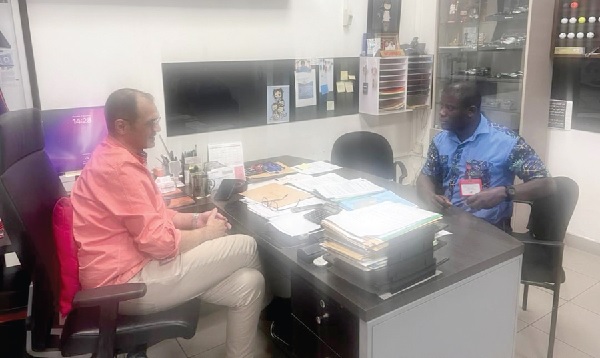
Implement GADP, reduce ban on used vehicles to five years —Kalmoni
The Executive Director of Japan Motors, Nouhad Kalmoni, has called on the government to swiftly implement the Ghana Automotive Development Policy (GADP) and also reduce the age of imported vehicles into the country from 10 years to five years.
He said that would guarantee the mass purchase of locally produced vehicles in the country and grow the auto industry.
“It will also improve the sales of new vehicles which are at a higher pricing while making returns on the investments the government has done in the auto-industry,” he told the Graphic Business in an exclusive interview in Accra last Thursday.
He revealed that the auto industry was reeling under the volumes of imported used cars in the country which was killing the initiative of locally produced and assembled cars in the country.
“For every 10 cars on our road, only two are new cars sold by a local distributor, the rest are all sold by grey market importers," he stated.
GADP
The Ghana Automotive and Development Policy (GADP) also known as ‘The Auto Policy’ was fashioned out by the Ministry of Trade and Industry and was geared towards making Ghana a fully integrated and competitive industrial hub of the automotive industry in the West African sub-region.
It also aims to generate highly skilled jobs in automotive assembly and the manufacture of components and parts, with spillover effects into other sectors of the economy; while establishing an asset-based vehicle financing scheme for locally manufactured vehicles to ensure affordability for vehicle buyers.
This is expected to improve balance of payments through competitive import substitution and export market development while also improving vehicle safety and environmental standards.
It is also expected to transform the quality of the national road transport fleet and safeguard the natural environment.
Holistic approach
Mr Kalmoni noted that for GADP to be effective it needed a holistic approach, which entails banning the import of used cars which is more than five years since it production and ensuring that local manufacturers have favourable credit facilities with the banks to make new vehicles affordable to Ghanaians.
“The value-based duty rebate Scheme which offers a 35 per cent import duty rebate for Fully Built Units (FBUs) is laudable but we need to stop the mass importation of used vehicles which are older than five years, not the 10 years age range we are currently witnessing. This doesn’t help local manufacturers," he noted.
Stability of the currency
He called on the government to ensure the stability of the local currency to ensure a sound footing for the auto industry.
“The economy and currency have to be stable, that will guarantee the banks offering credit at affordable rates and ensure the citizens can also access credit to buy vehicles,” he noted.
Ban on used vehicles
On May 29, 2020, Ghana banned the importation of cars older than 10 years. The move was to encourage international companies including Volkswagen AG and Nissan Motor Co. to set up local plants in the West African country.
Lowest sales in years
Mr Kalmoni noted that the current economic crisis that reared its head late last year halved sales of it vehicles and continues to have a debilitating effect on the auto industry.
“A big chunk of Pick-Up contractors who are into road construction stopped the purchase of these vehicles because of the economic crisis, at least for now. On a normal year we produce 1200 units of vehicles but this year we are targeting only 600 units,” he told the Graphic Business.
Tema Assembling Plant
He revealed that 40 people were currently employed at the auto-dealer’s assembling plant. Adding that the plant was currently producing five models, the Nissan Navarra Pick-Up, Peugeot Landterk Pick-Up, Peugeot 3008 SUV, Foton TM Series Small Truck and the 15-seater Foton View Bus.
He also disclosed that 100 units of vehicles were currently being produced at the Tema Plant monthly. “It can be tripled with enough demand and enough market. The Ghana auto development policy must be fully implemented,” he stated.
He noted that with nine million dollars and an additional 1 million dollars invested in the two new foton models at the Tema Plant, it was disappointing that they were not able to recoup such an investment in the next two decades because of the failure of the state to fully implement GADP.
Hope for the Future
Mr Kalmoni was hopeful that there would be a turnaround next year. He noted that an election year was expected to boost sales as political parties crisscross the country for votes.